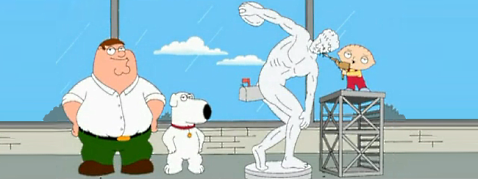Open letter to the RIAA: Illegal file sharing problem solved?

Dear the Recording Industry Association of America (the "RIAA"),
I know I've said some harsh things before, and to be honest, I still stick by them. The Family Guy musical sketch describing the characters' opinions of the FCC could well be replicated here in view of your own organisation.
However, today I offer you a potential solution to the illegal file sharing problem that seems to have gripped the world stage.

In a nutshell, if you live in the United States and are caught downloading illegally, you can consider yourself already bankrupt, as the RIAA will sue you into the ground. However, under new legislation in the UK, instead of hefty fines, the Government could order your ISP to cut off your broadband connection.
This has annoyed the ISPs on this side of the pond because they claim while they provide the service, it is not their job to police how their customers use it.
The problem
I honestly believe that with the price of media at the moment, the vast majority of people would be content in buying media online - provided they could have it there and then in a download. The problem is that many popular items are simply not available online to buy. Granted, this has changed with the Amazon and iTunes wave of technologies and services, but it still isn't up to scratch.Also, the peer-to-peer technology and online file sharing is an open Pandora's Box and now cannot be closed. You can attempt to take random people to court and financially send them back into the Stone Age, but you cannot convict everyone.
The recording and broadcasting industries must change to survive. You cannot sustain the business model you once had because the times have changed, along with the content delivery system and the generation of people.
The solution
In the UK, to effectively raise enough revenue to help roll out super-fast fibre-optic broadband, the Government added a £0.50 "tax" on top of every monthly phone bill. There are roughly 34 million landlines in the UK, so that will generate £17 million a month. Add another £1 to this and you'll generate (an obvious) £34 million.The UK's equivalent to the RIAA is the PRS - the Performing Right Society. Every time a record is played on the radio, the royalties are paid by the radio station to the PRS, who then divide up all the money from that month (or other specified amount of time) and pass on the royalties to the artists. No doubt, this is what the RIAA does also.
So with the £34 million generated each month, the PRS can use the already-available technologies to see what is being downloaded, take some of the money for their own inconvenience and divide the rest up to content creators.
When using torrents, it's clear to see when you are (or have) downloaded an episode of a popular TV series, so in that case, a small portion of the overall royalties can go back to the creators of the series.
The under-belly
A £1 tax a year sounds harsh to some members of the tax paying community. Over here, the very vast majority of us pay roughly £0.70 a year on paying for the Royal Family which brings in huge revenues from tourists who, quite frankly, could be easily entertained by giving them a balloon on a stick instead. An extra £1 would generate huge revenues and the PRS would be able to do their job much more effectively.Of course, the numbers can be interchangeable but with a greater population and exchange rate differences, $1 should suffice.
The system works, in a way, very much like the UK's National Health Service. We all chip in pretty much the same amount of money through taxes, but as you would expect, some people need more treatment than others. Here, we don't mind doing that because if we switched to the American system then a good proportion of the country simply couldn't afford medical treatment - even in an emergency.
In conclusion
But because we live in the digital age that we do - we cannot be waiting around for months at a time for the latest Harry Potter film to be released to DVD. So we search alternative sources and download it illegally. Release the online download as soon as the film is out, and then we can buy and watch it there and then. You won't be losing out in revenue, because at least this way youa) won't have people downloading it for free, and
b) when those people are caught, you're not spending tens of thousands of dollars bringing them to court.
This is why cable companies are bringing popular U.S. television shows to other countries as and when they are broadcast in the U.S. You can't have a programme floating around the Internet for half a year and expect people to wait patiently until it arrives in their region. No, they'll turn to the web and they'll download it for free.
It makes sense, and everybody wins - so do something about it.
Kind regards,
Zack xx